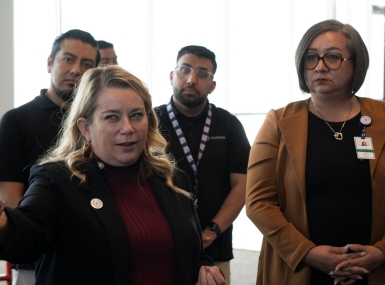How are counties taking action for infants and toddlers?
Author

Arabella Pluta-Ehlers
Upcoming Events
Related News

Key Takeaways
For nearly two years, families with young children have dealt with the negative impacts of the coronavirus (COVID-19) pandemic, including economic hardships, limited access to child care and increased stress and social isolation. In recent months, as the pandemic has surged, many parents are once again seeing disruptions to their work schedules and facing temporary childcare closures. These issues have short-term and potential long-term effects on children’s health, learning and well-being.
Through these tumultuous times, counties have been on the front lines — supporting childcare providers with grants and resources, serving families through health and human service agencies and investing in systems that make it easier for families with young children to access supports. Through the Counties for Kids initiative, NACo Research Foundation is increasing awareness among county leaders on the important role they play in making prenatal-to-three (PN-3) investments and sharing county wins like the ones below. The following are examples of what some counties are doing to take action in this area.
Supporting infant, toddler and parental well-being
Warren County, Ohio: Inspired by a long-standing program in a neighboring county, Butler County, Ohio, Warren County first launched its Therapeutic Interagency Preschool (TIP) program to support preschool-aged children who experience trauma. In recent years, the county has seen increases in reported substance abuse, family violence and foster or kinship care arrangements. Recognizing the need to serve young children before they reach preschool, Warren County created “Baby TIP.” The program serves infants, toddlers and their families through an Early Head Start-Child Care Partnership.
Learn more
Counties are uniquely positioned to create innovative approaches promoting PN-3 that meet the unique needs of the community. To learn more about what your county can do for infants and toddlers or to share your success story, visit www.countiesforkids.org.
When it comes to best practices and working with evidence-based programs like TIP, Warren County Commissioner Shannon Jones encourages counties not to reinvent the wheel but be mindful of what additional or unique needs exist in your county: “We saw the TIP program working in another county and that gave us some confidence that we could enact it here.”
“As the program was established, we heard from our partners that infants and toddlers who were too young for TIP would also benefit from these services,” Jones said. “So, we took the existing best practice and what we had learned from working with 3- and 4-year-olds and tweaked it to serve children birth to three.”
New Castle County, Del.: County Executive Matt Meyer announced a $3 million investment of the county’s American Rescue Plan Act (ARPA) funds over the next three years to expand the Nurse-Family Partnership (NFP) home-visiting program, which connects trained nurses to first-time expectant mothers. These nurses provide home visits through the child’s second birthday and provide support, advice and connection to resources. With these new funds, NFP will serve an additional 120 first-time mothers in New Castle County and track outcomes for three years.
Increasing access to affordable, quality childcare
San Diego County, Calif.: The county is prioritizing childcare in its recovery efforts, recognizing the role it plays in supporting working parents. ARPA funds will be used to provide grants and vouchers to child-care providers and parents. The county is also piloting a program that will provide job training for new educators joining the field.
Becker County, Minn.: The Becker County Board of Commissioners leveraged ARPA funding to create two grant opportunities for childcare providers. The Family Child Care Startup Grant offers up to $10,000 to help offset startup costs for new licensed providers. The Childcare Provider Emergency Assistance Grant offers existing providers support for costs incurred due to COVID-19.
“As a community, we recognize how important quality and affordable childcare is to our local economy,” said Guy Fischer, coordinator for the Becker County Economic Development Authority. “We’ve listened to our business community, parents, child care providers and other stakeholders to create programs that increase child care slots, stabilize existing child care providers, help would-be providers navigate the licensing process and create learning and certification opportunities at our local high school for students interested in the field.”
Creating sustainable financing for early childhood systems
In November 2020, voters in both Escambia County and Leon County, Fla. created independent tax districts that will invest in community programs demonstrating positive outcomes for children. These successful efforts show promise for other counties considering dedicated funding streams for children prenatal-to-three.
Leon County, Fla.: Leon County established a ballot measure initiative by forming a planning committee charged with engaging more than 80 community groups and organizations, including the chambers of commerce, sheriffs and law enforcement, clergy and the county school board on the effort. Many of these leaders then wrote op-eds in local papers in support of the measure and to build public will on the significance of investments in children.
Escambia County, Fla.: Achieve Escambia, a cradle-to-career coalition, reviewed local data among stakeholders and found that outcomes for children in the county were remaining flat or worsening. The group worked with over 200 community members to write letters to the commission board expressing support for a ballot measure and held over 100 virtual events to increase awareness and share messaging on the importance of dedicated investments in children’s services.


